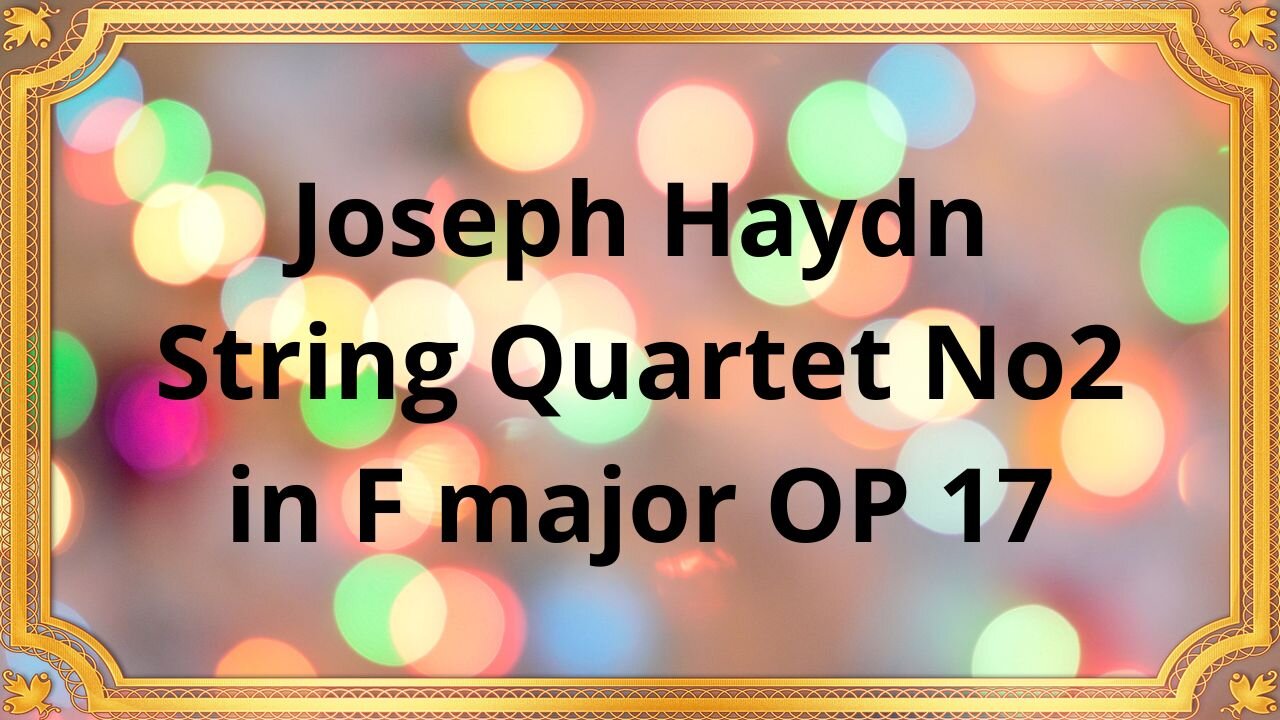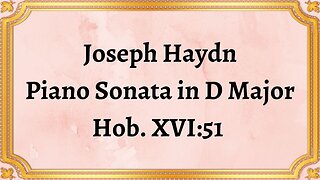Premium Only Content

Joseph Haydn String Quartet No2 in F major OP 17
#JosephHaydn #StringQuartet #ClassicalMusic #MusicalComposition #ChamberMusic #FMajor #OP17 #ClassicalComposer #ClassicalEra
JOSEPH HAYDN COMPLETE STRING QUARTETS OF OP17
Publication date 1951
SCHNEIDER QUARTET
Alexander Schneider, First Violin
Isidore Cohen, Second Violin
Karen Tuttle, viola
Madeline Foley, violoncello
Joseph Haydn, a prominent figure of the classical era, crafted countless timeless compositions that have left an indelible mark on the world of music. Among his remarkable works, the String Quartet No. 2 in F major, Op. 17, shines as a gem of musical excellence.
Composed in the late 1770s, Haydn's String Quartet No. 2 in F major emerged during a period of musical revolution. The classical era witnessed a shift towards a more balanced and refined style, with composers like Haydn at the forefront of this transformation. As one of the pioneers of the string quartet genre, Haydn's Op. 17 quartets stand as a testament to his mastery and innovation.
The String Quartet No. 2 in F major showcases Haydn's brilliance in crafting melodies that captivate the listener. Composed of four movements, this quartet adheres to the traditional structure of the classical string quartet. The opening movement, marked Allegro moderato, introduces a lively and energetic theme that sets the tone for the entire piece. The second movement, Adagio, offers a serene and contemplative atmosphere, inviting the listener on a melodic journey of introspection. The third movement, Menuetto, presents a charming and graceful dance-like character, while the final movement, Presto, concludes the quartet with a vibrant and spirited flourish.
Haydn's ability to blend the four instrumental voices - two violins, viola, and cello - is evident throughout the quartet. He weaves together intricate melodies, creating a harmonious conversation between the instruments. Haydn's attention to detail and his seamless transitions between themes contribute to the overall elegance and sophistication of the piece.
The String Quartet No. 2 in F major, Op. 17, holds a significant place in the repertoire of chamber music. Haydn's meticulous craftsmanship and his ability to balance technical complexity with emotional depth have ensured the quartet's enduring legacy. Moreover, this quartet served as a source of inspiration for future composers, including Mozart and Beethoven, who expanded upon Haydn's innovations and pushed the boundaries of the genre.
Conclusion:
Joseph Haydn's String Quartet No. 2 in F major, Op. 17, stands as a testament to his genius and mastery of composition. Its historical context, melodic intricacies, and lasting impact all contribute to its significance in the world of classical music. As we immerse ourselves in the enchanting melodies and intricate harmonies of this quartet, we gain a deeper appreciation for Haydn's artistic brilliance and his profound influence on the evolution of chamber music. The String Quartet No. 2 in F major continues to captivate audiences, offering a glimpse into the timeless beauty and elegance of Haydn's musical legacy.
You have the opportunity to support the channel:
https://destream.net/live/RadSiarAl/donate
https://www.buymeacoffee.com/6355radsiaral
-
 6:07
6:07
Classical music_Music Inspiration
21 days agoJoseph Haydn Piano Sonata in D Major, Hob. XVI:51
701 -
 17:24
17:24
Exploring With Nug
6 hours agoScuba Diving on Underwater Cars Searching For Missing Man!
6.1K1 -
 3:06:12
3:06:12
Jewels Jones Live ®
1 day agoWASTE, FRAUD & ABUSE | A Political Rendezvous - Ep. 110
55.4K8 -
 25:11
25:11
BlackDiamondGunsandGear
2 hours agoAnderson AR-15 / Is Budget Trash?
2.6K6 -
 1:21:05
1:21:05
Michael Franzese
7 hours agoDemocrats MELTDOWN Over DOGE—Plus More on JFK’s Assassination | LIVE
70.9K88 -
 10:02
10:02
RTT: Guns & Gear
16 hours ago $1.37 earnedEAA Girsan Influencer X 1911 - The Cheat Code For Accuracy
12.9K -
 11:03
11:03
Degenerate Jay
3 days ago $0.65 earnedHenry Cavill James Bond Was Almost A Reality
14K8 -
 31:58
31:58
CarlCrusher
1 day agoDiscovering the Secret Ultra Low Spectrum for UFO Contact and Skinwalker Ranch
10.5K -
 3:44
3:44
Rethinking the Dollar
1 day agoMichigan’s Big Bitcoin Move—What It Means!
30.3K1 -
 16:56
16:56
Chris From The 740
16 hours ago $0.51 earnedIs The Ruger RXM A Viable Carry Option? Let's Find Out!
18.1K3